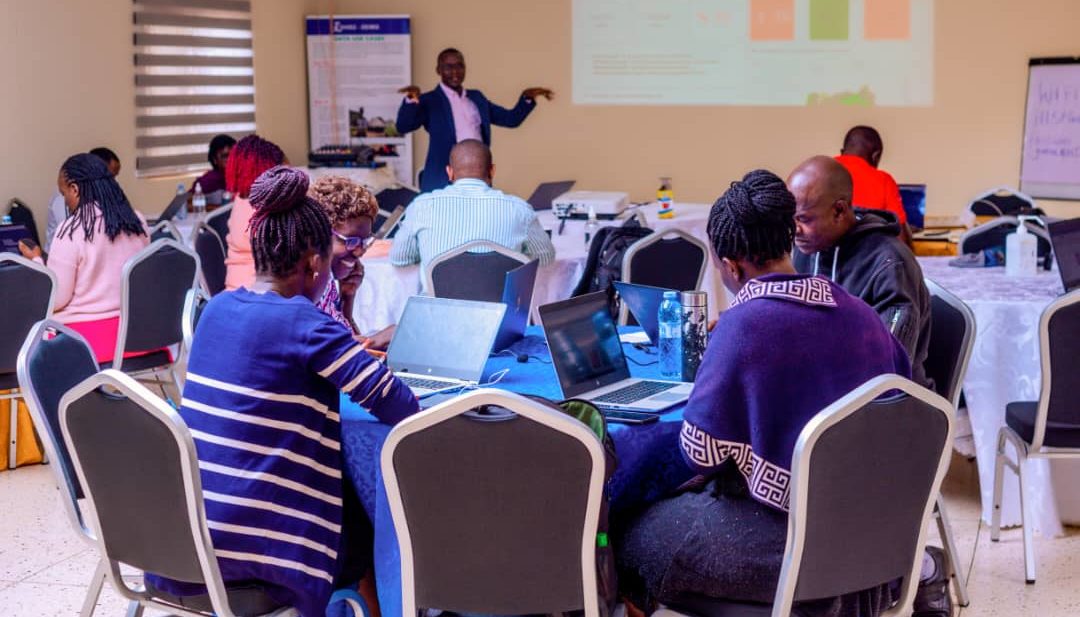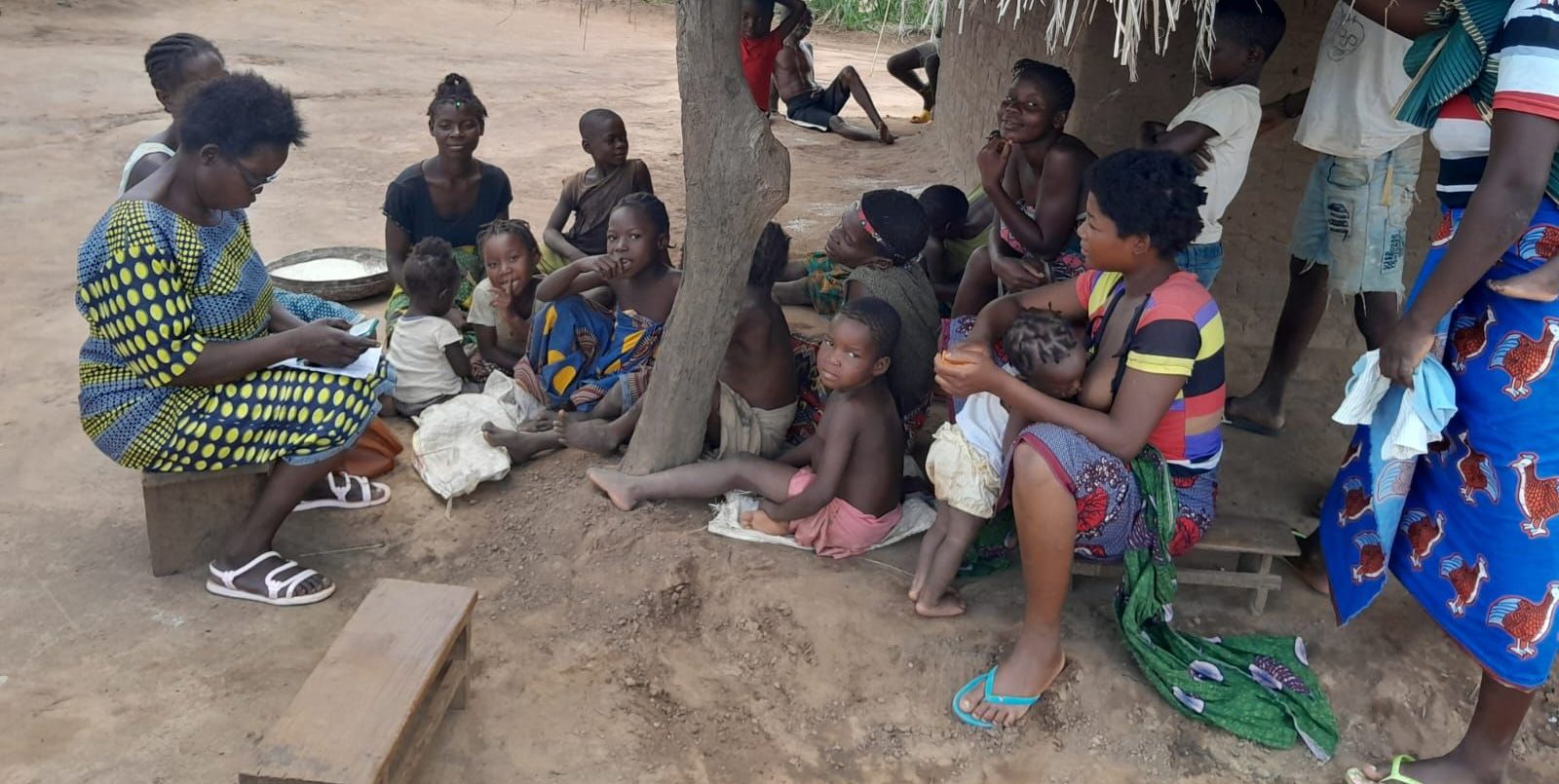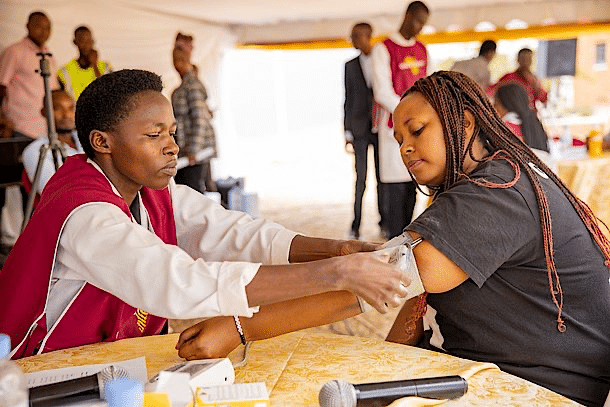Esta página ha sido traducida de manera automática y puede contener errores
Creación de un sistema estandarizado, seguro y verificable de certificados de vacunas para COVID-19 en Laos utilizando DHIS2
HISP Vietnam apoya la implantación en Laos de un certificado digital de la vacuna COVID-19 reconocido internacionalmente y basado en las normas de la UE.
Cuando el COVID-19 se convirtió en una crisis sanitaria mundial, los países adoptaron medidas restrictivas que incluían rigurosos cierres y cierre de fronteras para contener la propagación del virus. Los viajes internacionales se detuvieron rápidamente. Tras la disponibilidad de vacunas contra el virus en 2021, los gobiernos de todo el mundo iniciaron la que posiblemente sea la mayor campaña de vacunación simultánea del mundo. Para gestionar mejor las campañas de vacunación, los países introdujeron certificados de vacunación, a menudo denominados pasaportes de vacunación, que se utilizan para identificar a las personas que se han vacunado completamente contra COVID-19.
A medida que más personas se vacunaron, se reanudaron lentamente los viajes locales e internacionales, pero esto planteó un nuevo reto: la falta de certificados de vacuna COVID-19 normalizados y fácilmente verificables que puedan utilizarse para validar el estado de vacunación de los viajeros.
HISP Vietnam, con el apoyo del equipo de interoperabilidad de DHIS2, adoptó las especificaciones técnicas contenidas en las directrices de aplicación del Certificado Digital COVID (DCC) de la UE para construir un sistema de generación y validación de certificados COVID en DHIS2 para la RDP de Laos. El sistema ha ayudado a Laos a implantar un sistema de certificados digitales para generar, firmar y verificar los certificados COVID, así como a ayudar al Ministerio de Sanidad a autenticar otros documentos importantes para mejorar la seguridad. Los certificados generados por el sistema pueden verificarse tanto en línea, a través de un portal público, como fuera de línea utilizando claves seguras de firma de certificados, incluso por las autoridades sanitarias y de control fronterizo de otros países. Esta solución ya está disponible gratuitamente en Github, lo que permite a otros países aprovechar esta innovación local.
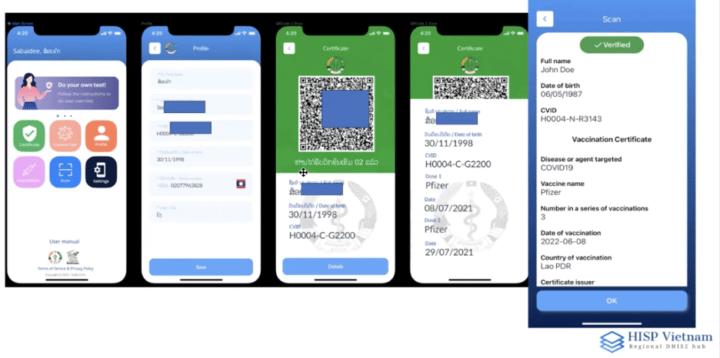
Elección de una norma para un certificado digital COVID-19 en Laos: consideraciones de seguridad, simplicidad e interoperabilidad
HISP Vietnam tuvo en cuenta algunas normas aceptables a nivel mundial a la hora de determinar la arquitectura y el método para diseñar un sistema eficaz de certificados COVID. El sistema Digital Infrastructure for Verifiable Open Credentialing (DIVOC), que utilizó las directrices y el estándar de arquitectura digital para un certificado de vacunación digital inteligente establecido por el Grupo de Trabajo sobre Certificados de Vacunación Inteligentes de la OMS en 2021, fue la primera plataforma probada por el equipo de HISP Vietnam para generar certificados de vacunas COVID. La plataforma DIVOC ya se había integrado con DHIS2 para los certificados digitales COVID-19 en Sri Lanka. Sin embargo, al revisar esta opción, HISP Vietnam la consideró insostenible en el contexto de Laos, dada la complejidad de la integración y la necesidad de un importante apoyo técnico a largo plazo por parte de los equipos de HISP y DIVOC que conllevaría. En consecuencia, HISP Vietnam consideró otras opciones.
De forma similar al Certificado de Documentación Digital de COVID-19 (DDCC) de la OMS, la Red eHealth de la UE había desarrollado un conjunto de especificaciones técnicas para la implantación del Certificado Digital de COVID de la UE (EU DCC). El DCC de la UE se puso en marcha para fomentar la seguridad de los viajes y la libre circulación dentro de la UE mediante la normalización de los sistemas de generación y verificación de certificados de vacunación por parte de los países miembros. Esta norma facilita la creación de certificados de vacunas que contengan códigos QR, tanto en formato digital como en papel, y es notablemente segura. Todos los Estados miembros de la UE han adoptado la norma DCC de la UE para sus sistemas de certificados COVID, al igual que varios países no pertenecientes a la UE de África, Asia y Sudamérica.
La norma DCC de la UE fue seleccionada por HISP Vietnam como el enfoque preferido para el desarrollo del sistema de certificados COVID-19 para Laos. El modelo más sencillo de la norma DCC de la UE facilita la generación segura de certificados en DHIS2 sin necesidad de duplicar los datos del registro de vacunas en una plataforma externa. También estaba dentro de las competencias técnicas del equipo de HISP Vietnam desarrollar el sistema de certificados de vacunas en DHIS2 utilizando esta directriz, utilizando así las competencias locales y evitando la necesidad de depender de equipos externos para el apoyo técnico a largo plazo.
Estructura del sistema de certificados de vacunas COVID en Laos
En la RDP de Laos, el Ministerio de Sanidad había desplegado el paquete de metadatos de vigilancia DHIS2 COVID-19 para el seguimiento de la propagación del virus por todo el país. El sistema, implantado con la ayuda de HISP Vietnam, ha ayudado a Laos a generar datos precisos sobre el patrón de propagación de la enfermedad, apoyando los esfuerzos para reducir el virus. A partir de ahí, la solución de certificados COVID extrae datos esenciales del registro de vacunación COVID de DHIS2, que luego se utiliza para generar un certificado seguro mediante claves de firma de certificado privadas (pki) emitidas por la autoridad de firma autorizada, en este caso, el Ministerio de Sanidad.
En Laos, se desarrollaron aplicaciones web y móviles personalizadas para acceder al servicio de generación de certificados. Para adoptar los servicios de generación de certificados de COVID dentro de DHIS2, HISP Vietnam desarrolló una solución de formulario personalizado que podía incluirse dentro del módulo genérico de seguimiento de DHIS2 en lugar de crear y mantener aplicaciones web personalizadas. Esta solución de formulario personalizado también se ha adoptado en Vanuatu y Surinam para su generación de certificados COVID.
La solución de formulario personalizado se desarrolló para ayudar al Ministerio de Sanidad de Laos a expedir certificados tanto en el alfabeto local de Laos, que se utiliza en el país, como en inglés para los viajes internacionales. Las aplicaciones personalizadas desarrolladas por HISP Vietnam están disponibles públicamente en google y apple play store para los residentes de Laos, que pueden autogenerar sus propios certificados de vacunación proporcionando identificadores como el ID de vacunación y la fecha de nacimiento, entre otros.
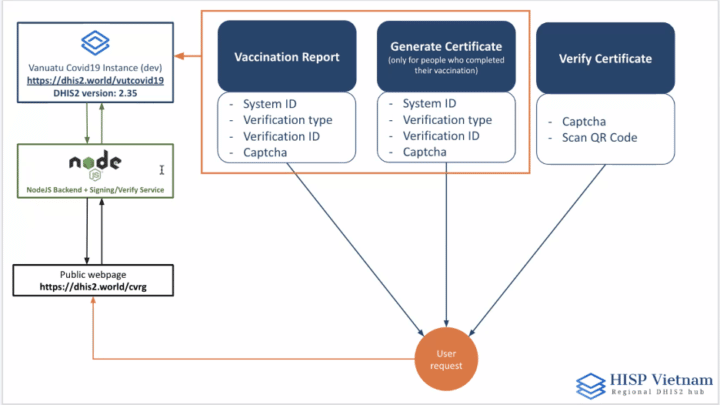
Los certificados generados por el sistema son verificables de dos maneras: a través de un portal público y mediante el uso de una clave de cifrado pública. El portal público es un sitio web accesible por cualquier persona y no requiere registro. Cualquier dispositivo con cámara puede utilizarse para escanear el código QR adjunto al certificado de vacunación generado para su autenticación inmediata. Con este método, los certificados generados pueden verificarse en cualquier lugar siempre que se disponga de acceso a Internet. Hasta ahora, este método ha sido utilizado en todo Laos, así como por funcionarios de Singapur y Filipinas, para validar los certificados COVID presentados por viajeros internacionales procedentes de Laos. El segundo método para verificar los certificados de vacunas generados por el sistema es con la clave pública de cifrado emitida por la autoridad firmante. El Ministerio de Sanidad de Laos puede compartir esta clave con socios, organizaciones o gobiernos autorizados para facilitar la verificación offline de los certificados de vacunas. A tal efecto, las autoridades competentes de Singapur han recibido una clave pública que puede utilizarse para verificar los certificados presentados por los viajeros de Laos sin necesidad de conexión a Internet.
Ventajas exclusivas del sistema de certificados COVID: Accesibilidad de los datos para el usuario final, verificación no intrusiva de los certificados, refuerzo de los sistemas más allá de COVID y uso de normas internacionales que apoyan la aceptación generalizada.
El sistema de certificados COVID de HISP Vietnam se centró en una solución sencilla y fácil de mantener mediante la integración del repositorio de datos de vacunas con el sistema de generación de certificados, evitando así la necesidad de modificar el núcleo de la aplicación DHIS2. El sistema ha ayudado al Ministerio de Sanidad a generar y verificar los certificados de vacunas COVID, pero más allá de eso, hay algunos resultados de la aplicación que destacan.
Accesibilidad de los datos de usuario
: La mayoría de los países mantienen algún tipo de registro para almacenar y rastrear los datos de su población que está previsto vacunar o que ha sido vacunada contra COVID-19. Durante la pandemia de COVID-19, muchos países desplegaron registros electrónicos utilizando DHIS2 para permitir la entrada de datos desde múltiples puntos y una respuesta rápida. El equipo de HISP Vietnam ha ampliado su sistema para permitir que las personas que han sido vacunadas revisen sus datos en el registro para comprobar que son correctos y están completos. Para ello, se espera que las personas introduzcan su identificación de vacunación y otros identificadores en un portal público para acceder a sus registros en Tracker. Posteriormente, si observan un error en sus datos, pueden tomar medidas para que se corrijan poniéndose en contacto con los centros sanitarios o de vacunación. Esta función sirve para mejorar la calidad y la integridad de los datos del sistema, contribuyendo así a una investigación, planificación y gestión de alta calidad.
Verificación de certificados segura y no intrusiva
: El sistema de certificados COVID de Laos se diseñó para permitir la verificación fuera de línea de los certificados emitidos sin necesidad de acceder al registro nacional de vacunas del país. Para ello, la autoridad de firma del país puede generar un par de claves privadas y públicas que se utilizan para cifrar y descifrar los datos del usuario codificados en el certificado, respectivamente. A continuación, los datos cifrados se presentan en formato de código QR que el usuario puede imprimir o descargar. La autoridad de firma del país podría entonces compartir la clave pública con cualquier usuario u organización autorizados que puedan verificar posteriormente la autenticidad del certificado generado sin conectarse al registro de vacunas. Este sistema garantiza aún más la seguridad de los datos de los usuarios al eliminar la necesidad de acceso remoto a los registros de usuarios en el registro, al tiempo que permite la autenticación de certificados sin conexión a Internet.
Refuerzo de los sistemas más allá de COVID
: La práctica habitual para expedir documentos oficiales en los ministerios consiste en imprimirlos, firmarlos y sellarlos. También es de conocimiento general que esta práctica consagrada no proporciona capacidades adecuadas ni oportunas de autenticación de documentos. Como parte del proceso de implantación del sistema de certificados COVID en Laos, HISP Vietnam facilitó el establecimiento de las autoridades de firma del país en los Ministerios de Sanidad y TIC para generar claves de firma de certificados para la validación de documentos. También se familiarizó al personal de los ministerios con las mejores prácticas mundiales de uso de certificados digitales para el control y la validación de documentos. Se espera que esto impulse el uso de certificados digitales para firmar muchos otros documentos emitidos por el ministerio, además de los certificados COVID.
Aceptabilidad generalizada
: El sistema de certificados COVID de Laos se desarrolló sobre la base de las directrices DCC de la UE, que esbozan marcos para un sistema unificado de generación y verificación de certificados COVID en toda Europa. En la actualidad, el sistema lo utilizan todos los países de la Unión Europea y 48 terceros países de África, Asia y Sudamérica. Al adoptar esta norma, los certificados expedidos en Laos son potencialmente aceptables en esos países, lo que simplifica los viajes de los usuarios y la verificación para los funcionarios.
Explore y descargue esta solución en Github
Nota: El enfoque para generar certificados digitales en Laos desarrollado por HISP Vietnam descrito anteriormente es un modelo útil para países en los que no existe una solución previa para crear y firmar certificados digitales. Los países que ya disponen de soluciones de certificados digitales pueden integrar los datos directamente desde los programas DHIS2 Tracker sin necesidad de duplicar la introducción de datos. Un ejemplo de este enfoque es Cabo Verde, donde los datos del registro de vacunación COVID-19 basado en DHIS2 se envían a través de una capa de interoperabilidad desarrollada por Saudigitus(HISP Mozambique) a la plataforma gubernamental de generación y alojamiento de certificados. En el caso de Cabo Verde, estos certificados también se basan en el esquema de la UE y se aceptan para viajar a la UE.
